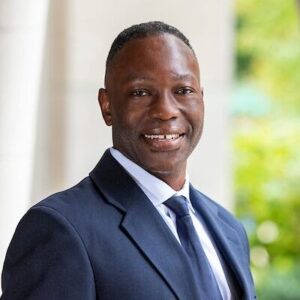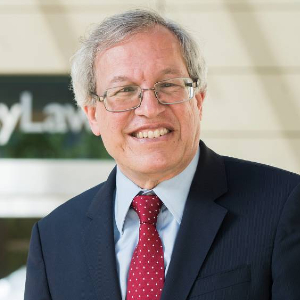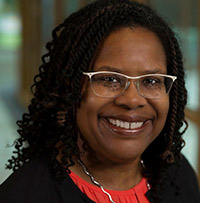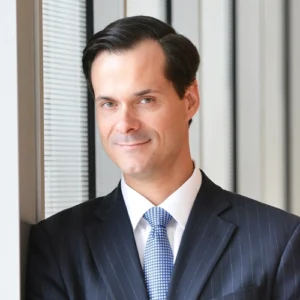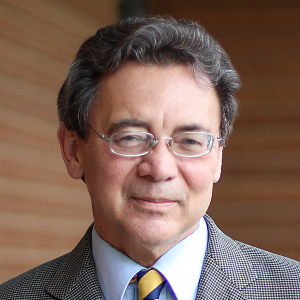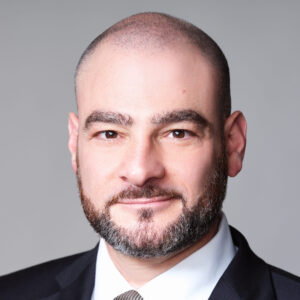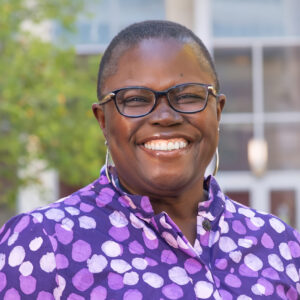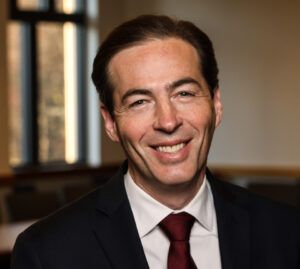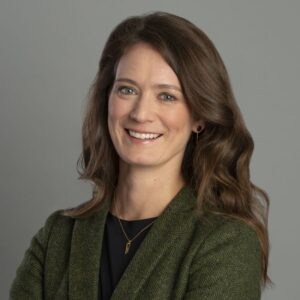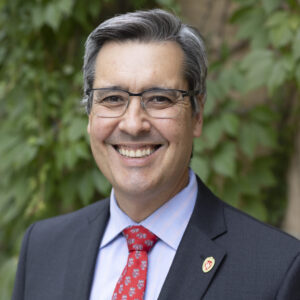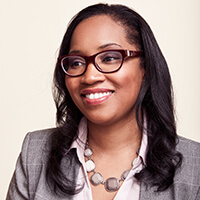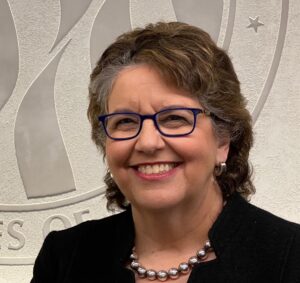Mark C. Alexander
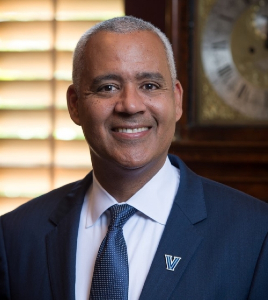
Mark C. Alexander, JD is the Arthur J. Kania Dean and Professor of Law at the Villanova University Charles Widger School of Law. As the School’s chief administrator and chairperson of the faculty, Alexander is responsible for all facets of the Law School, including its long-term strategic and academic planning, curricular initiatives, faculty research and teaching support, student services, and fundraising and alumni relations.
Alexander previously served as Associate Dean for Academics at Seton Hall University’s School of Law. His responsibilities included oversight of the curriculum’s academic components, collaboration with the faculty and administration on implementation of the School’s strategic plan, and management of the career, enrollment and student services offices. A member of Seton Hall’s Law School faculty for two decades, he was honored as Professor of the Year on numerous occasions.
Alexander’s areas of expertise include constitution law, election law, the First Amendment and criminal procedure. His research interests focus on the constitutional dimensions of election law and campaign reform. Alexander has authored several books on the First Amendment and constitutional law, and his scholarship has been published in leading journals such as Harvard Journal of Law & Public Policy, Stanford Law & Policy Review and NYU Review of Law & Social Change.
Regularly interviewed by national print and broadcast media, Alexander is a sought-after speaker and panelist for national and international law symposiums and academic forums. He possesses significant international experience, having spent a year in Spain teaching American law and politics on a Fulbright Scholarship, as well as teaching in the Seton Hall Law-in-Italy program. He is also a fellow of the U.S.-Japan Leadership Program. Alexander served on the J. William Fulbright Foreign Scholarship Board from 2010 to 2014, having been appointed by President Barack Obama.
In addition to his leadership in academia, Alexander has also served as an adviser and issues director for several high-profile political campaigns. Prior to joining the Seton Hall Law School faculty in 1996, he clerked for Chief Judge Thelton Henderson of the United States District Court for the Northern District of California and was a litigator with Gibson, Dunn & Crutcher in San Francisco. Alexander earned a Juris Doctor from Yale University Law School and a Bachelor of Arts in Architecture from Yale University.
Guy-Uriel Charles
Guy-Uriel E. Charles is the Charles J. Ogletree Jr. Professor of Law at Harvard Law School where he also directs the Charles Hamilton Institute for Race and Justice. He writes about how law mediates political power and how law addresses racial subordination. He teaches courses on civil procedure; election law; constitutional law; race and law; critical race theory; legislation and statutory interpretation; law, economics, and politics; and law, identity, and politics. He is a member of the American Academy of Arts & Sciences and the American Law Institute. He was appointed by President Joseph Biden to the Presidential Commission on the Supreme Court of the United States. He is currently working on book, with Luis Fuentes-Rohwer, on the past and future of voting rights, under contract with Cambridge University Press, which argues that the race-based model that underlies the Voting Rights Act has run its course and that the best way to protect against racial discrimination in voting is through a universal, positive rights model of political participation. He is also co-editing, with Aziza Ahmed, a handbook entitled Race, Racism, and the Law, under contract with Edward Elgar Publishing. This book will survey the current state of research on race and the law in the United States and aims to influence the intellectual agenda of the field.
His academic articles have appeared in Constitutional Commentary, The Michigan Law Review, The Michigan Journal of Race and Law, The Georgetown Law Journal, The Journal of Politics, The California Law Review, The North Carolina Law Review, and others. He is co-author of Election Law in The American Political System (with James Gardner) and Racial Justice & Law: Cases And Materials (with Ralph Richard Banks, Kim Forde-Mazrui and Cristina Rodriguez). He is co-editor of The New Black: What Has Changed And What Has Not With Race In America (with Kenneth Mack) and Race, Reform, And Regulation Of The Electoral Process: Recurring Puzzles In American Democracy (with Heather Gerken and Michael Kang).His public writings have appeared in the New York Times, Washington Post, L.A. Time, Time, The Atlantic, Slate, among many venues. He has delivered distinguished lectures at various universities including University of California, Davis Law School, University of Richmond Law School, University of Oregon Law School, William and Mary Law School.
Professor Charles received his JD from the University of Michigan Law School and clerked for The Honorable Damon J. Keith of the United States Court of Appeals for the Sixth Circuit. While at the University of Michigan, he was one of the founders and the first editor-in-chief of the Michigan Journal of Race & Law. From 1995-2000, he was a graduate student in political science at the University of Michigan.
Before teaching at Harvard, he taught at Duke Law School and at the University of Minnesota Law School. He also served as interim co-dean at the University of Minnesota from 2006-2008. He has been a visiting professor at Georgetown, Virginia, and Columbia law schools. He was a past member of the National Research Commission on Elections and Voting and the Century Foundation Working Group on Election Reform. In 2006, he was awarded the distinguished teaching award at the University of Minnesota Law School. In 2016, he was awarded the distinguished teaching award at Duke Law School.
Erwin Chemerinsky
Erwin Chemerinsky became the 13th Dean of Berkeley Law on July 1, 2017, when he joined the faculty as the Jesse H. Choper Distinguished Professor of Law.
Prior to assuming this position, from 2008-2017, he was the founding Dean and Distinguished Professor of Law, and Raymond Pryke Professor of First Amendment Law, at University of California, Irvine School of Law. Before that he was the Alston and Bird Professor of Law and Political Science at Duke University from 2004-2008, and from 1983-2004 was a professor at the University of Southern California Law School, including as the Sydney M. Irmas Professor of Public Interest Law, Legal Ethics, and Political Science. From 1980-1983, he was an assistant professor at DePaul College of Law.
He is the author of sixteen books, including leading casebooks and treatises about constitutional law, criminal procedure, and federal jurisdiction. His most recent books are Worse than Nothing: The Dangerous Fallacy of Originalism (2022) and Presumed Guilty: How the Supreme Court Empowered the Police and Subverted Civil Rights (2021).
He also is the author of more than 200 law review articles. He is a contributing writer for the Opinion section of the Los Angeles Times, and writes regular columns for the Sacramento Bee, the ABA Journal and the Daily Journal, and frequent op-eds in newspapers across the country. He frequently argues appellate cases, including in the United States Supreme Court.
In 2016, he was named a fellow of the American Academy of Arts and Sciences. In 2017, National Jurist magazine again named Dean Chemerinsky as the most influential person in legal education in the United States. In 2022, he is the President of the Association of American Law Schools.
Danielle Conway
Danielle M. Conway is the dean and Donald J. Farage professor of law at Penn State Dickinson Law. A leading expert in procurement law, entrepreneurship, intellectual property law, and licensing intellectual property, Dean Conway joined Dickinson Law after serving for four years as dean of the University of Maine School of Law and 14 years on the faculty of the University of Hawai’i at Mānoa, William S. Richardson School of Law, where she was the inaugural Michael J. Marks Distinguished Professor of Business Law.
Prior to her deanships, Dean Conway was a member of the faculties at the Georgetown University Law Center and the University of Memphis Cecil C. Humphreys School of Law. She also served as a Fulbright Senior Scholar in Australia and later as Chair in Law at LaTrobe University, Faculty of Law & Management in Australia. Dean Conway is the author or editor of six books and casebooks as well as numerous book chapters, articles, and essays. Her scholarly agenda and speeches have focused on, among other areas, advocating for public education and for actualizing the rights of marginalized groups, including Indigenous Peoples, minoritized people, and members of rural communities. Dean Conway’s most recent publication focuses on different aspects of building an antiracist law school, legal academy, and legal profession through leadership, vision priorities, and transformational diversity, equity, and inclusion-focused admissions and faculty and staff recruitment and retention.
Dean Conway is the co-recipient of the inaugural Association of American Law Schools’ (AALS) Impact Award, which honors individuals who have had a significant, positive impact on legal education or the legal profession. Dean Conway received this recognition for her work in establishing the Law Deans Antiracist Clearinghouse Project. Launched in June 2020, the project is a webpage for law deans, faculty and staff, and the public that contains resources and information related to addressing racism in law and legal education. Dean Conway also serves as one of three co-chairs of the Select Penn State Presidential Commission on Racism, Bias, and Community Safety.
Dean Conway earned her bachelor’s degree from New York University Stern School of Business, double majoring in finance and international business. She earned her J.D. degree, with honors, from the Howard University School of Law, where she graded on to the Howard Law Journal and served on the leadership board of the National Moot Court Team. She holds dual LL.M. degrees in Government Procurement Law and Environmental Law from the George Washington University Law School. She has been admitted to the bars in the District of Columbia, Hawai’i, New Jersey, and Pennsylvania.
Anthony Crowell
Anthony W. Crowell is marking his eleventh year as New York Law School’s 16th Dean and President. He has served in the role since May 2012. He has taught state and local government law at NYLS since 2003. As a first generation student and a longtime New York City public servant, Dean Crowell proudly reintroduced NYLS as New York’s law school. His management philosophy is rooted in his experience as a senior executive in New York City government for more than a decade, where he served as Counselor to Mayor Michael R. Bloomberg. Under the Dean’s leadership, NYLS has repositioned itself as a law school for the 21st century lawyer and a leader in New York City and State government. It issued its first comprehensive Strategic Plan in 2013. The School’s latest Strategic Plan reflects the new demands and opportunities confronting law schools and the profession as a result of the global pandemic and America’s racial reckoning. NYLS also published an Institutional Diversity Plan; built an Office of Diversity, Equity, and Inclusion; adopted a dynamic and successful new curriculum—known as Think BIG—and is developing best in class academic and bar success programs.
Dean Crowell has also led the creation of new academic centers, institutes, and leadership programs that capitalize on New York City’s fastest-growing job sectors, including those focused on financial services, technology and intellectual property, government and public interest, and in-house counsel and the business of law. Under Dean Crowell, NYLS became one of the first law schools to combine its academic planning and career development functions into a seamless unit, maximizing the student advising experience and driving more meaningful outcomes.
In his prior role as Counselor to the Mayor, Dean Crowell was counsel to the Mayor, a senior management and policy advisor, as well as general counsel to the Office of the Mayor. For more than a decade in City Hall, he successfully managed a broad portfolio of legal, regulatory, legislative, governance, economic development, administrative, and operational matters focused on enhancing New York City’s performance, competitiveness, accountability, and public integrity. He also worked on numerous civil rights and government-access initiatives affecting women, immigrants, and people with disabilities. Dean Crowell served as Executive Director, Counsel, or Commissioner of six city Charter Revision Commissions.
He was previously an Assistant Corporation Counsel in the New York City Law Department’s Tax & Condemnation and Legal Counsel Divisions, working on an array of real property tax, eminent domain, and land use and zoning issues. In 2001, he was counsel to the city’s Family Assistance Center, aiding families of 9/11 victims and directing the city’s World Trade Center Death Certificate Program. Dean Crowell began his career at the International City/County Management Association in Washington, D.C., where he managed government affairs and policy. He also served as a Law Clerk at the State and Local Legal Center assisting in the preparation of amicus briefs to the U.S. Supreme Court in constitutional federalism cases.
Dean Crowell is a leader in advancing American legal education. He is a member of the Executive Committees of the Association of American Law Schools as well as the Board of Trustees of the Commission on Independent Colleges and Universities in New York. He also is the Founding President of the National Association of Standalone Graduate Schools.
Dean Crowell also is a highly visible leader in the New York City and State legal and civic communities. He is a Commissioner on the New York City Planning Commission. He is Chair of the New York State Independent Review Committee for Nominations to the Commission on Ethics and Lobbying in Government. He serves on the Executive Committee (and was Chair for five years) of the Board of Trustees of the Brooklyn Public Library. He is a member of Board of Directors of the Citizens Union Foundation. And, he is a member of the New York City Bar Association’s New York City Affairs Committee. He previously served on the Board of Directors of the New York City Economic Development Corporation, and as a member of the New York City Conflicts of Interest Board for nine years. Further, he is a member of the Board of Directors of the Congressional Award Foundation in Washington D.C.
Kevin Johnson
Kevin R. Johnson is Dean, Mabie-Apallas Professor of Public Interest Law, and Professor of Chicana/o Studies. He joined the UC Davis law faculty in 1989 and was named Associate Dean for Academic Affairs in 1998. Johnson became Dean in 2008. He has taught a wide array of classes, including immigration law, civil procedure, complex litigation, Latinos and Latinas and the law, and Critical Race Theory. In 1993, he was the recipient of the law school’s Distinguished Teaching Award.
Dean Johnson has published extensively on immigration law and civil rights. Published in 1999, his book How Did You Get to Be Mexican? A White/Brown Man’s Search for Identity was nominated for the 2000 Robert F. Kennedy Book Award. Dean Johnson’s book, Immigration Law and the US-Mexico Border (2011), received the Latino Literacy Now’s International Latino Book Awards – Best Reference Book. He is co-author of two editions of Immigration Law and Social Justice (2d ed. 2022). Dean Johnson blogs at ImmigrationProf.
A regular participant in national and international conferences, Dean Johnson has also held leadership positions in the Association of American Law Schools and is the recipient of an array of honors and awards. He is quoted regularly by the New York Times, Los Angeles Times, and other national and international news outlets.
A magna cum laude graduate of Harvard Law School, where he served as an editor of the Harvard Law Review, Dean Johnson earned an A.B. in economics from UC Berkeley, graduating Phi Beta Kappa. After law school, he clerked for the Honorable Stephen Reinhardt of the U.S. Court of Appeals for the Ninth Circuit and worked as an attorney at the international law firm of Heller Ehrman White & McAuliffe. Dean Johnson has served from 1996-2022 on the board of directors of Legal Services of Northern California and as President of the board. From 2006-11, he served on the board of directors of the Mexican American Legal Defense and Education Fund, the leading Mexican-American civil rights organization in the United States.
Dean Johnson is the recipient of many awards and honors, including the Association of American Law Schools Minority Groups Section Clyde Ferguson Award (2004), the Hispanic National Bar Association Law Professor of the Year award (2006), the National Association of Chicana and Chicano Studies Scholar of the Year award (2008), the Central American Resource Center (CARECEN) Romero Vive Award (2012), and the Centro Legal de la Raza Outstanding Achievements in the Law Award (2015). In 2003, he was elected to the American Law Institute.
Justin Levitt
A nationally recognized scholar of constitutional law and the law of democracy, Professor Justin Levitt has returned to Loyola after serving from 2021-22 as the White House’s first Senior Policy Advisor for Democracy and Voting Rights. There, within a team devoted to racial justice and equity, Levitt assisted the President in his efforts to make sure that every eligible American has secure, reliable access to a meaningful vote; to provide equitable representation in government; to restore trust in a democracy deserving of that trust; and to bolster avenues by which Americans build community and engage in civic participation.
Levitt had previously served in federal government as a Deputy Assistant Attorney General in the Civil Rights Division of the U.S. Department of Justice. At DOJ, he primarily supported the Civil Rights Division’s work on voting rights and protections against employment discrimination (including federal statutory protections against workplace discrimination based on race, ethnicity, sex — including pregnancy, sexual orientation, and gender identity — religion, national origin, citizenship status, and military service).
Levitt has published in the flagship law reviews at Harvard, Columbia, NYU, Georgetown, and William & Mary, the peer-reviewed Election Law Journal, and the flagship online law journals at Yale and NYU, among others. He has served as a visiting faculty member at the Yale Law School, at USC’s Gould School of Law, and at Caltech. He was Loyola’s Associate Dean for Research from 2017-20, and was honored to receive Loyola’s Excellence in Teaching Award in 2013-14 and 2019-20.
Levitt served as a law clerk to the Honorable Stephen Reinhardt of the U.S. Court of Appeals for the Ninth Circuit. He holds a law degree and a masters degree in public administration from Harvard University, and was an articles editor for the Harvard Law Review. He is admitted to the bar in California, New York, and the District of Columbia, and to the U.S. Supreme Court, the U.S. Courts of Appeal for the Fourth Circuit, Ninth Circuit, and Eleventh Circuit, and the U.S. District Court in the Central District of California.
Kimberly Mutcherson
Kimberly Mutcherson is Co-Dean and Professor of Law at Rutgers Law School in Camden. Dean Mutcherson is a reproductive justice scholar whose work sits at the intersection of bioethics, health law, and family. She has a particular focus on assisted reproduction, abortion, disability, and medical decision-making for pregnant women and children. Cambridge University Press released her edited volume, Feminist Judgments: Reproductive Justice Rewritten in 2020.
In 2021, Dean Mutcherson received the Association of American Law Schools inaugural Impact Award as a co-founder of the Law Deans Antiracist Clearinghouse Project. She received the Center for Reproductive Rights Innovation in Scholarship Award in 2013, a Chancellor’s Teaching Excellence Award in 2011, and the Women’s Law Caucus Faculty Appreciation Award in 2011 & 2014.
Dean Mutcherson has been a Senior Fellow/Sabbatical Visitor at the Center for Gender and Sexuality Law at Columbia Law School and a Visiting Scholar at the Center for Bioethics at the University of Pennsylvania. She received her B.A. from the University of Pennsylvania and her J.D. from Columbia Law School. She also received the Kirkland and Ellis Fellowship for post-graduate public interest work upon her graduation from Columbia. Prior to joining the faculty at Rutgers, Dean Mutcherson was a consulting attorney at the Center for Reproductive Law and Policy (now the Center for Reproductive Rights) and a Staff Attorney at the HIV Law Project.
Andrew Perlman
Dean Andrew Perlman is a nationally recognized voice on the future of legal education and law practice. Dean Perlman was the chief reporter of the American Bar Association’s Commission on Ethics 20/20, which was responsible for updating the ABA Model Rules of Professional Conduct to reflect changes in technology and increased globalization. He also served as the vice chair of the ABA Commission on the Future of Legal Services, which produced projects and recommendations designed to improve how legal services are delivered and accessed. In addition, he was appointed by the president of the American Bar Association to serve as the inaugural chair of the governing council of the ABA’s new Center for Innovation. In 2015, he was recognized by FastCase as one of 50 “entrepreneurs, innovators, and trailblazers … who have charted a new course for the delivery of legal services.”
Most recently, Dean Perlman has served as a founding member of the Advisory Committee of the ABA-Legal Education Police Practices Consortium; a member of the Law School Admission Council’s Legal Education Program Advisory Committee, which is developing an alternate pathway to law school admission; a member of the American Academy of Arts & Sciences, Access to Justice Advisory Committee; a co-chair of the Massachusetts Supreme Judicial Court Subcommittee on Alternative Paths to Licensure; and a member of the Content Scope Committee of the National Conference of Bar Examiners (NCBE), which helped to identify content for the next generation of the bar exam.
Dean Perlman has written numerous articles on professional responsibility that have appeared in some of the nation’s leading law reviews. He was a co-author (2008-2019) of the annually updated book, Regulation of Lawyers: Statutes and Standards (with Stephen Gillers and Roy D. Simon), and he has co-authored a civil procedure casebook, Civil Procedure: A Coursebook (with Professors Joseph W. Glannon and Peter Raven-Hansen) that has been adopted at more than 80 law schools.
Dean Perlman has served as a presenter or panelist at more than 100 academic, judicial, and other professional programs in more than 20 U.S. jurisdictions, three continents, and four countries.
Prior to entering academia, Dean Perlman clerked for a federal district court judge in Chicago and practiced as a litigator there. He is an honors graduate of Yale College and Harvard Law School, and he received his LL.M from Columbia Law School.
Kate Shaw
Kate Shaw is a Professor of Law and the Co-Director of the Floersheimer Center for Constitutional Democracy. Before joining Cardozo, Professor Shaw worked in the White House Counsel’s Office as a Special Assistant to the President and Associate Counsel to the President. She clerked for Justice John Paul Stevens of the U.S. Supreme Court and Judge Richard A. Posner of the U.S. Court of Appeals for the Seventh Circuit.
Professor Shaw graduated with a B.A. magna cum laude from Brown University and with a J.D. magna cum laude and Order of the Coif from Northwestern University, where she served as the Editor-in-Chief of the Northwestern University Law Review and won the John Paul Stevens Award. Her scholarly work has appeared, among other places, in the Northwestern University Law Review, the Columbia Law Review, the Cornell Law Review, the Texas Law Review, and the Georgetown Law Journal, and her popular writing has appeared in the New York Times, Slate, and the Take Care blog. She recently edited the book “Reproductive Rights and Justice Stories,” with Reva Siegel and Melissa Murray. She also serves as a contributor with ABC News, co-hosts the Supreme Court podcast Strict Scrutiny, and serves as a Public Member of the Administrative Conference of the United States (ACUS).
Daniel Tokaji
Dan Tokaji is the Fred W. & Vi Miller Dean and Professor of Law at the University of Wisconsin Law School. As Dean, he serves as the chief academic and executive officer of the school, with responsibility for faculty and staff development, personnel oversight, strategic planning and institutional vision, fundraising, budget planning and management, curriculum, and student academic affairs
Dean Tokaji became Dean of the University of Wisconsin Law School in 2020. From 2003 to 2020, he was on the faculty at Ohio State University, where he served as Associate Dean for Faculty and Charles W. Ebersold & Florence Whitcomb Ebersold Professor of Constitutional Law. He has taught a wide variety of courses, including Civil Procedure, Civil Rights Lawyering, Comparative Constitutional Law, Election Law and Voting Rights, Federal Courts, First Amendment, Legal Analysis and Writing, Legislation and Regulation, and the U.S. Legal System. He has also taught at Harvard Law School, Hong Kong University, and Oxford University.
A leading authority in the field of Election Law, Dean Tokaji’s scholarship addresses questions of voting rights, free speech, and democratic inclusion. He has published over 50 law review articles, book chapters, and other scholarly papers on a wide range of topics. His recent work includes “Election Law, Democracy, and Legal Education” in Beyond Imagination? The January 6 Insurrection (2022), “Voter Registration in a Pandemic,” University of Chicago Law Review Online (2020), “Denying Systemic Equality: The Last Words of the Kennedy Court,” Harvard Law & Policy Review (2019), and “Gerrymandering and Association,” William & Mary Law Review (2018). He is the author of Election Law in a Nutshell (2d ed. 2016), and co-author of Election Law: Cases and Materials (7th ed. 2022). His recent scholarship addresses the challenges facing democracies around the globe, including the free speech issues surrounding digital disinformation, the need for trustworthy electoral institutions, and the role of law schools in strengthening democratic governance.
Media have frequently relied on Dean Tokaji’s expertise on election law, voting rights, and free speech issues. He has been quoted or interviewed by the New York Times, Wall Street Journal, Washington Post, and National Public Radio, and many other outlets.
Dean Tokaji graduated summa cum laude from Harvard College, with an A.B. degree in English and American Literature and Language and Philosophy, then earned a J.D. from Yale Law School. Dean Tokaji clerked for the Honorable Stephen Reinhardt of the Ninth Circuit Court of Appeals. A former civil rights lawyer, he has brought many free speech, racial justice, and voting rights cases over his career.
Franita Tolson
Franita Tolson is the George T. and Harriet E. Pfleger Chair in Law at the University of Southern California Gould School of Law. She also holds a courtesy faculty appointment in the Political Science and International Relations Department at the USC Dornsife College of Letter, Arts and Sciences.
Her scholarship and teaching focus on the areas of election law, constitutional law, legal history, and employment discrimination. She has written on a wide range of topics including partisan gerrymandering, political parties, the Elections Clause, the Voting Rights Act of 1965, and the Fourteenth and Fifteenth Amendments.
Her research has appeared or will appear in leading law reviews including the Yale Law Journal, Harvard Law Review, Stanford Law Review, California Law Review, University of Pennsylvania Law Review, and Vanderbilt Law Review. Tolson is one of the coauthors of the leading election law casebook, The Law of Democracy (Foundation Press, 6th ed., forthcoming 2022). Her forthcoming book, In Congress We Trust?: Enforcing Voting Rights from the Founding to the Jim Crow Era, will be published in 2023 by Cambridge University Press.
As a nationally recognized expert in election law, Tolson has written for or appeared as a commentator for various mass media outlets including The New York Times, The Los Angeles Times, the Wall Street Journal, Reuters and Bloomberg Law. She has testified before Congress numerous times on voting rights issues. She has also authored a legal analysis for an amendment to the U.S. Constitution, introduced by Senator Elizabeth Warren and Senator Richard Durbin, that would explicitly protect the right to vote. During the fall of 2020, Tolson worked as an election law analyst for CNN. She currently co-hosts an election themed podcast, Free and Fair with Franita and Foley, with Ned Foley of The Ohio State University Moritz College of Law.
Prior to joining USC, Tolson was the Betty T. Ferguson Professor of Voting Rights at Florida State University College of Law and a visiting assistant professor at Northwestern University School of Law. Before entering academia, she clerked for the Honorable Ann Claire Williams of the United States Court of Appeals for the Seventh Circuit and the Honorable Ruben Castillo of the Northern District of Illinois.
Tolson is a graduate of the University of Chicago Law School, where she was the Walter V. Schaefer Visiting Professor of Law during the Spring 2021 academic quarter.
Ellen Weintraub
Ellen L. Weintraub has served as a commissioner on the U.S. Federal Election Commission since 2002 and chaired it for the third time in 2019.
During her tenure, Weintraub has served as a consistent voice for meaningful campaign-finance law enforcement and robust disclosure. She believes that strong and fair regulation of money in politics is important to prevent corruption and maintain the faith of the American people in their democracy.
Weintraub sounded the alarm early–and continues to do so–regarding the potential for corporate and “dark-money” spending to become a vehicle for foreign influence in our elections. She has published articles in The New York Times, The Washington Post, and leading law reviews and is a frequent speaker on news shows and at conferences at home and abroad.
Weintraub is a native New Yorker with degrees from Yale College and Harvard Law School. Prior to her appointment to the FEC, Weintraub was Of Counsel to the Political Law Group of Perkins Coie LLP and Counsel to the House Ethics Committee.

